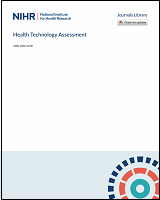NCBI Bookshelf. A service of the National Library of Medicine, National Institutes of Health.
Parr J, Pennington L, Taylor H, et al. Parent-delivered interventions used at home to improve eating, drinking and swallowing in children with neurodisability: the FEEDS mixed-methods study. Southampton (UK): NIHR Journals Library; 2021 Mar. (Health Technology Assessment, No. 25.22.)

Parent-delivered interventions used at home to improve eating, drinking and swallowing in children with neurodisability: the FEEDS mixed-methods study.
Show detailsIntroduction
- Thank you for attending.
- Introductions of everyone involved in group: Research Associate (RA), other research team members and their roles.
- Introductions of participants – acknowledge that some participants may know each other in a personal or professional role. If this is the case, reinforce confidentiality issues and clarify that they are comfortable with continued participation.
- Explain purpose of project and this focus group:
- We are looking for feedback from people involved in treatments for eating, drinking and swallowing for young children with neurodisability that can be delivered by parents at home: parents, professionals and young people.
- We want to know about their experiences of treatments for EDSD for young children with neurodisability, the practicalities – good and bad.
- No right or wrong answers – not a test of knowledge.
- Ground rules of group – everyone’s contribution is valued; confidentiality.
- Consent – written – because we want to be reviewing content and analysing data.
- Explain group discussion audio-recorded to make sure that it is documented accurately, but details will be confidential.
- If participants have any questions about care of a relative or client the RA the participant will be listened to, answered briefly and then offered the opportunity to discuss with the team afterward. We will try to signpost them to someone locally who can help.
- Questions or concerns?
Ask participants to read and sign consent forms
Participants, experience of treatments for eating, drinking and swallowing for young children with neurodisability
- Which interventions have you experience of?
- Where and when – setting of use? School or home or other.
- Who prescribes the treatments?
- What are the good things about the treatments?
- What are the challenges to the treatments? What do you not like?
- What/who do the treatments work best for?
- How has the success of the treatments been evaluated?
- What are the important outcomes to measure regarding treatments for eating, drinking and swallowing?
- How should these be measured? Are any specific tools known about?
Give participants debrief information sheet
- First round of focus groups topic guide - Parent-delivered interventions used at...First round of focus groups topic guide - Parent-delivered interventions used at home to improve eating, drinking and swallowing in children with neurodisability: the FEEDS mixed-methods study
- SAMEA4535761 (1)SRA
Your browsing activity is empty.
Activity recording is turned off.
See more...